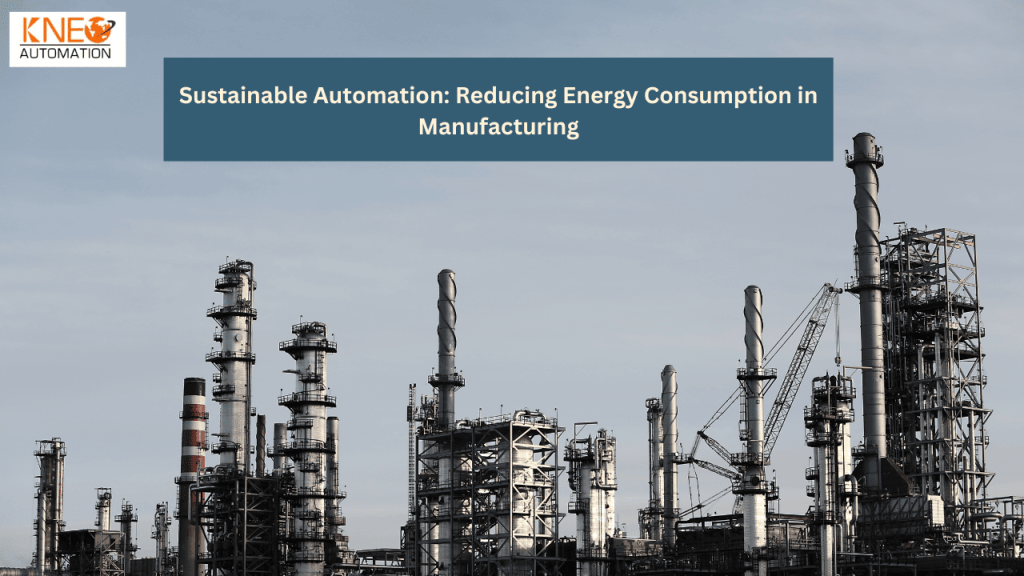Sustainable Automation: Reducing Energy Consumption in Manufacturing

Manufacturing plays an important role in our modern world, producing the products and goods that we use every day. However, it also utilizes a significant amount of energy, which can contribute to environmental concerns like pollution and climate change.
To resolve these issues, there’s a growing emphasis on sustainable automation in manufacturing. Sustainable automation focuses on reducing energy consumption while maintaining or improving productivity.
In this article, we will explore how sustainable automation can help minimize energy consumption in manufacturing.
The Need for Sustainability
Before we delve into the benefits of sustainable automation, it’s important to understand why sustainability matters.
According to the Renewable and Sustainable Energy Reviews global industrial energy consumption is predicted to grow from 5.129E+07 GWh in 2006 to 7.198E+07 GWh in 2030 for the next 25 years.
Energy consumption in manufacturing has a considerable environmental impact. Traditional manufacturing processes often depend on fossil fuels and outdated machinery, leading to high energy consumption and carbon emissions.
This not only harms the environment but can also result in higher production costs.
Sustainable Automation Defined
Sustainable automation is the integration of advanced technologies and practices to reduce energy use, waste, and environmental harm in manufacturing processes. It includes the utilization of smart machines, artificial intelligence, and data analytics to optimize operations, minimize energy waste, and improve overall efficiency.
Ways Sustainable Automation Reduces Energy Consumption
1. Energy-Efficient Machinery: Sustainable automation includes using energy-efficient equipment and machines. These machines are designed to consume less energy while maintaining or even improving production rates. They can automatically adjust their power utilization based on demand, reducing unnecessary energy consumption.
2. Predictive Maintenance: One of the advantages of automation is the ability to predict when machines will require maintenance. This prevents unexpected breakdowns and downtime, allowing for better energy management and efficiency.
MAPP Vita is a master of maintenance. It seamlessly connects with your existing ERP and MES systems, harmonizing your operations unlocking a whole new level of efficiency, and optimizing maintenance activities.
3. Energy Monitoring and Management: Sustainable automation systems often include energy monitoring tools. These tools track energy usage in real-time, allowing manufacturers to rectify energy-intensive processes and make necessary adjustments.
4. Renewable Energy Integration: Some manufacturers are taking it a step further by embracing renewable energy sources, such as solar panels or wind turbines, into their production facilities. This reduces their reliance on fossil fuels and further lowers their carbon footprint.
5. Process Optimization: Automation enables the fine-tuning of manufacturing processes. By monitoring data and making real-time adjustments, manufacturers can optimize processes for energy efficiency without compromising product quality.
Benefits of Sustainable Automation
- Reduced Energy Costs: By using less energy, manufacturers can significantly lower their energy bills, leading to cost savings that can be reinvested in the business.
- Environmental Benefits: Sustainable automation helps minimize carbon emissions and pollution, contributing to a cleaner and healthier environment.
- Improved Competitiveness: Companies that embrace sustainable automation can improve their competitiveness by offering eco-friendly products and reducing their carbon footprint, which can be a selling point for environmentally conscious consumers.
- Regulatory Compliance: Many regions have strict environmental regulations. Sustainable automation helps manufacturers comply with these regulations, avoiding potential fines and legal issues.
Conclusion
Sustainable automation in manufacturing is not only about saving costs; it’s about safeguarding our earth for future generations.
By minimizing energy consumption, companies can lower their environmental impact while also reaping the benefits of cost savings and improved competitiveness.
As technology continues to develop, sustainable automation will play an important role in shaping a more sustainable and eco-friendly manufacturing industry
